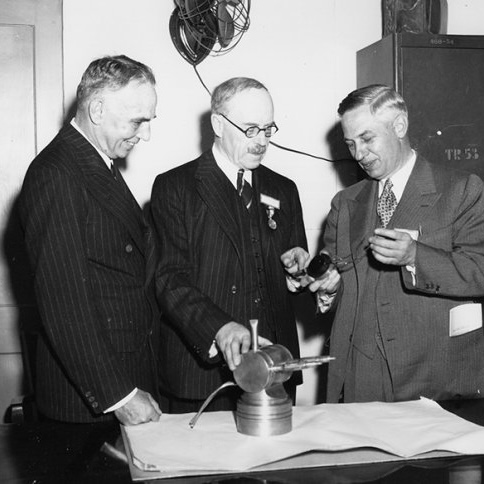How Britain can borrow America’s top scientists
the spectator, 7 jun 2025
As US science funding falters, Britain creating posts for top American researchers would be a win for science on both sides of the Atlantic.
From the time of Newton, Britain led the world in science. That began to change in 1940, when, with the Battle of Britain raging, Winston Churchill sent the scientist Henry Tizard on a secret mission to America. His objective was to secure financial and industrial help in the fight against Hitler. His currency was British military technologies, foremost among them the cavity magnetron, a device that made it possible to locate the enemy with radar. This wowed the Americans and achieved the objective. According to one historian, it was “the most valuable cargo ever brought to America’s shores”.
While arguably signalling a hand-over of scientific power, these events catalysed the Anglo-American scientific alliance, which has seen a flow of talent ever since between our two nations. At times there have been concerns that this might be one-way traffic: from us to them. Yet now that Donald Trump looks set to halve the budget of the National Science Foundation, it will most likely be the reverse. The jobs website of the journal Nature suggests that the number of American scientists looking to get out of Dodge has risen by a third.
Talent is on the move, so what are we doing about it? Last month, Chi Onwurah MP, who heads the government’s Science and Technology Committee, wrote to the Science Minister Lord Patrick Vallance posing this very question. She suggested we create “a special visa…to reduce the costs of attracting top talent leaving the US”.
Onwurah is right that we need to act, but visas aren’t the key. While they are more expensive in Britain than in France or Germany, they represent only a small fraction of the real price of recruiting talent, which is dominated by salary and support costs. I know this from personal experience. The last ten foreign scientists we brought to the London Institute for Mathematical Sciences, where I work, cost us £3m, of which £30,000 was spent on the Global Talent visas and related charges. High visa costs may give out the wrong signal to candidates, but a 1% change to the bottom line won’t make much difference.
What we need is a dedicated recruitment campaign to bring this “most valuable cargo” to our shores. The world’s best scientific talent rarely comes up for grabs, but now it has.
We have to find the money, fast, to create new posts that are ring-fenced for American scientists. The EU says it is spending €500m on posts that are open to foreigners. Big deal. Most scientific posts are open to anyone. Britain must create new posts that are set aside for American talent. If this is hard for the government, then agile institutions like the London Institute will have to step into the breach.
Think of it this way. If you learned that Albert Einstein was considering leaving the Institute for Advanced Study, would you create a post for foreigners, then say: “We’ve done what we can”? Of course not. You’d get on a plane to Princeton and have coffee with the man.
When Russia invaded Ukraine three years ago, the London Institute didn’t just create jobs for foreigners. We raised £3m for Fellowships that were ring-fenced not only for Ukrainian talent, but also for world-class Russians looking to leave their country. We flew to Paris, Frankfurt, Warsaw, Tel Aviv and Beijing to talk émigré Russian scientists into making their home with us in London. Our programme is the largest of its kind in the world.
That £3m in funding didn’t come from the government. We raised it from philanthropic organisations that have a special concern for Russian talent, such as the Khodorkovsky Foundation, and smaller contributions from individuals.
It’s going to be the same story when it comes to creating posts for Americans. This year so far, we have raised £2m—a quarter of the £8m target we’ve set ourselves—and used it to bring American-based talent to Britain. This, too, hasn’t come from Westminster. Instead it is thanks to the generosity of the likes of Ben Delo, the British entrepreneur who funded a new fellowship at the London Institute so we could recruit a physicist from Harvard.
If you want someone to join you, you must tell them you want them. At a party, you must cross the room. To win over Americans, you must cross the Atlantic, as Tizard did in 1940.
Britain has a headstart in this race, which is that moving to Britain is already an attractive prospect for American scientists. I know this myself, as a Texan physicist who crossed the Atlantic to do my PhD and never went back. Why did I stay? It was partly because this is the country of Sir Isaac Newton and Sir Roger Penrose, of the Cavendish Laboratory and the cavity magnetron. Partly, too, it was because of the Special Relationship between our nations, which since the Tizard Mission has never been more special than in science.
We should look at the coming wave of talent not as a prospective win for Britain but as part of the long-term scientific alliance between our two countries. That is a century old and will continue for a century to come. The talent will flow one way now and the other later. In the circumstances, the curious thing is that more places aren’t creating posts set aside for Americans. Let Britain lead the way.
Dr Thomas Fink is the Director of the London Institute for Mathematical Sciences.















